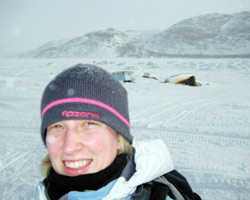Indigenous People May Face Health Issues From Climate Change, Study Says
February 28, 2012 - News Release
Indigenous people around the world face health threats from more bacteria in drinking water following major weather events such as heavy rainfall or from rapidly melting snow, says Sherilee Harper, a Vanier Canada Graduate Scholar in Aboriginal People’s Health at the University of Guelph.
 A recently published study co-authored by Harper explores links among weather patterns, water quality and gastrointestinal illness in two communities in Nunatsiavut in Canada’s North.
A recently published study co-authored by Harper explores links among weather patterns, water quality and gastrointestinal illness in two communities in Nunatsiavut in Canada’s North.
Weather events also affect the health of Uganda’s Batwa people. Harper is studying Batwa refugees driven from their forest homeland after the Ugandan government created a national park to protect silverback gorillas.
“The Batwa face similar social and societal issues to the Inuit, one of which is access to safe drinking water,” she said. “Comparing the two cultures allows me to examine and start addressing deficits in our understanding of the health dimensions of climate change among indigenous populations. This information can then be used to offer best practice guidelines and develop adaptation strategies in an indigenous context.”
Although she is still collecting data in both places, Harper’s early findings show extreme weather increases the risk of exposure to waterborne diseases. Both groups might risk health problems from more bacteria in their drinking water.
“There are many similarities in their health issues, and climate change is expected to have a further impact on these issues,” Harper said. “After a heavy rainfall, for example, there is an increase in E. coli and total coliforms in the water, which means there is an increased risk of exposure to these bacteria. In Nunatsiavut, where I started this research, clinic records showed a significant increase in cases of vomiting and diarrhea after high-impact weather events.”
Harper says more extreme weather events are likely and will affect indigenous people, such as Inuit hunters who drink from brooks or melt ice for drinking water.
“Under any climate change scenario, this problem is going to increase,” she said. “Waterborne diseases are a global issue. In fact, the World Health Organization projects that most of the climate change disease burden in the 21st century will be diarrhea and malnutrition.”
Harper’s supervisors are Victoria Edge, Public Health Agency of Canada; Prof. Scott McEwen, Department of Population Medicine in U of G’s Ontario Veterinary College; and James Ford, McGill University. Harper belongs to the regional operations team of the Indigenous Health Adaptation to Climate Change (IHACC) research program. By learning about vulnerability of remote indigenous health systems to climate change, IHACC researchers hope to help in adaptation and planning. IHACC researchers work in Peru, Uganda and Canada.
Harper discussed her research at the annual meeting of the American Association for the Advancement of Science held in Vancouver this month.
For media questions, contact Communications and Public Affairs: Lori Bona Hunt, 519-824-4120, Ext. 53338, or lhunt@uoguelph.ca, or Shiona Mackenzie, Ext. 56982, or shiona@uoguelph.ca.